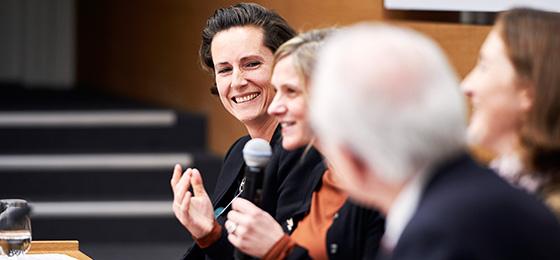"Who wants to work with a monastic workaholic?”

What expectations do professors have to live up to and how do they balance research, teaching, other academic activities and their private lives?
The mentoring programmes Mentoring Deutschschweiz and Réseau romand de mentoring pour femmes celebrated their 15th anniversary with a panel discussion and a networking event. About 90 current and former mentors, mentees and programme partners got together on 22 January 2016 at the SNSF in Bern (photos and other documents: see link below).
In a friendly, inspiring and open discussion, Marilyne Andersen, Annuska Derks, Juliet Fall and Norbert Thom talked about how they deal with the expectations and demands placed in them as professors. They encouraged the audience to make the most of any new tasks and roles that present themselves, even if they consider the timing premature. "You learn by doing and become better," Marilyne Andersen noted. But Norbert Thom also recommended taking into account one's own well-being and personal energisers when making decisions. "Accepting to become rector would have been taking the final step of my academic career, but it would have left too little time for teaching, supervision and professional exchanges with peers, all of which I value highly." They all agreed that their enthusiasm for science and their professorships were their strongest motivators.
Should that enthusiasm ever wane, that might be the time to start considering professions outside the academic world. "If you had a job outside academia matching your qualifications, it would be just as challenging and demanding as a professorship," Nicky Le Feuvre said to back up her view that a professorship is "a job amongst others" and nowhere as exclusive or special as people sometimes claim. She feels that it is important for academics not to downgrade a career outside academia and consider it a failure.
In addition, Nicky Le Feuvre suggested to question the myth of "total commitment". She was seconding Juliet Fall, who had already pointed out how important it was to be able to switch off at times. Previous generations had not lived like hermits either, pursuing only science. Professors preferred colleagues who were "normal" over monastic workaholics.
15th anniversary
The homecoming event on "Research, teaching, leadership... What are the demands on today's professors?" was organised to celebrate the 15th anniversary of Réseau Romand and Mentoring Deutschschweiz. Around 500 female doctoral students and postdocs have so far been supported under these programmes, and almost as many female and male professors. The programmes aim to promote young female academics up to the stage where they are fit to assume a professorship, and to assist them in forming networks reaching beyond individual campuses. In this context, professors meet young female researchers from outside their networks to learn about the different work conditions, life situations and gender-specific challenges they face.
Promoting gender equality in science
Réseau romand and Mentoring Deutschschweiz were launched in 2000 within the scope of the Federal Programme for Equal Opportunities 2000 - 2012/13, the first scheme to promote female doctoral students and upcoming researchers working on a habilitation. Back then, there were only very few official career development offers such as regular mentoring sessions, coaching, or courses to learn important transferable skills. The situation for women was particularly critical because they were, and still are, traditionally less integrated in networks spanning different levels in the hierarchy and they benefit less from informal mentoring than their male colleagues.
Up to 2016 the programmes were funded by the higher education institutions involved; the SNSF started supporting them in 2006. Mentoring Deutschschweiz will be discontinued at the end of March 2016, while Réseau romand is expected to continue in 2017.